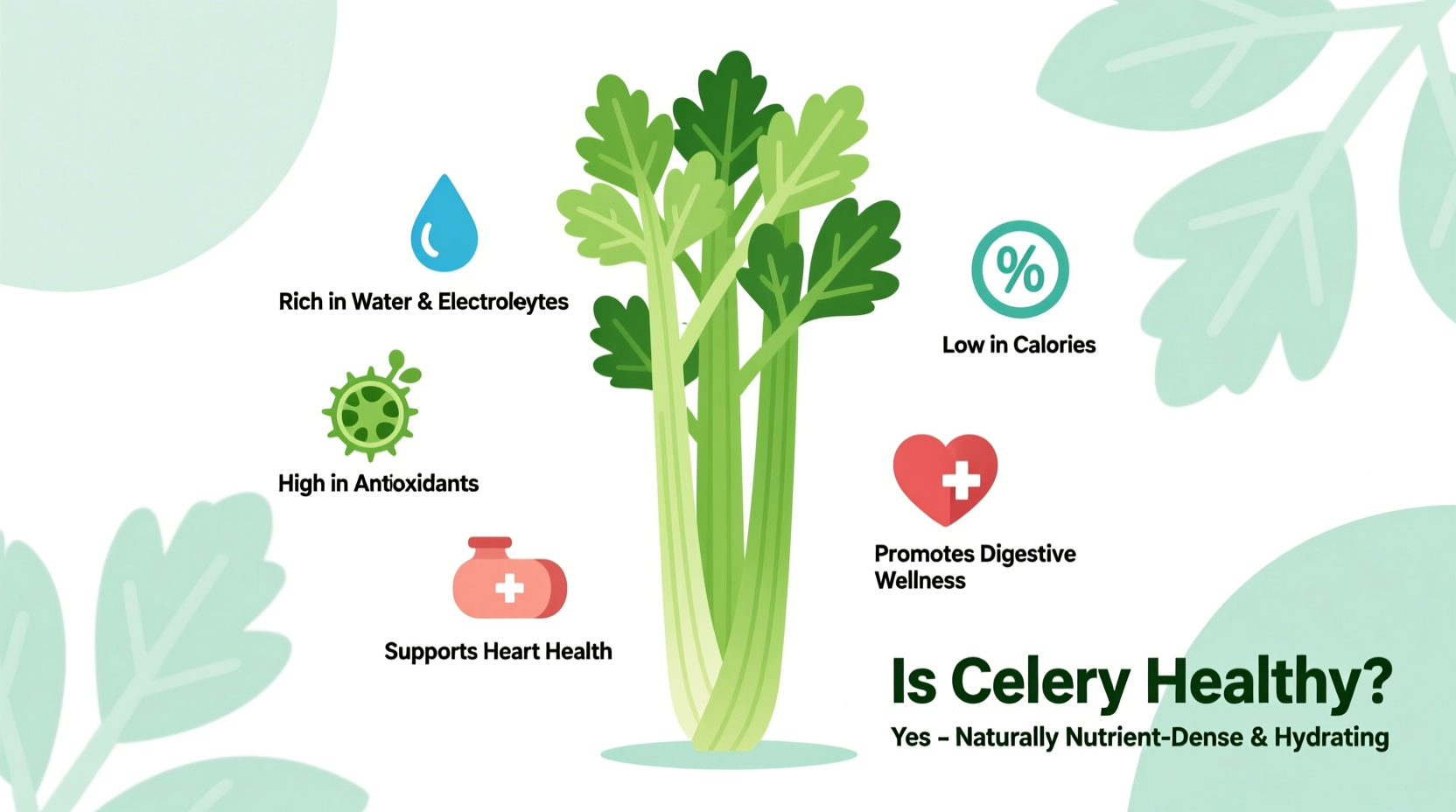When you're wondering is celery healthy, the answer goes beyond its reputation as a low-calorie snack. This crisp vegetable packs measurable nutritional value and science-backed health benefits that make it a worthy addition to balanced diets. Let's explore what makes celery a functional food worth incorporating intentionally.
What Makes Celery Nutritionally Valuable
Celery's health profile stems from its unique combination of hydration, fiber, and phytonutrients. Unlike many vegetables, it delivers benefits through multiple pathways—from supporting fluid balance to providing plant compounds with documented biological activity.
| Nutrient (per 100g) | Amount | Health Significance |
|---|---|---|
| Calories | 16 kcal | Supports weight management without sacrificing volume |
| Water Content | 95% | Contributes to daily hydration needs |
| Vitamin K | 29.6 μg (37% DV) | Essential for blood clotting and bone metabolism |
| Potassium | 260 mg | Supports healthy blood pressure regulation |
| Dietary Fiber | 1.6 g | Promotes digestive health and satiety |
Data source: USDA FoodData Central
Science-Backed Health Benefits of Celery
Hydration and Electrolyte Balance
With 95% water content and natural electrolytes like potassium, celery serves as an effective hydrating food. Research published in the Journal of Human Nutrition and Dietetics confirms that water-rich vegetables contribute significantly to daily fluid intake, particularly for individuals who struggle with drinking adequate water. The potassium content (260mg per 100g) helps maintain proper fluid balance—critical for cellular function and blood pressure regulation.
Digestive Health Support
Celery's fiber content (1.6g per 100g) works through two mechanisms: insoluble fiber adds bulk to stool, while soluble fiber feeds beneficial gut bacteria. A 2020 review in Nutrients highlighted how dietary fiber from vegetables like celery supports regular bowel movements and may reduce risk of digestive disorders. The natural sodium content (80mg per 100g) also helps maintain proper digestive tract function.
Anti-Inflammatory and Antioxidant Effects
Celery contains unique compounds called phthalides and over a dozen flavonoid antioxidants, including apigenin and luteolin. According to research in Frontiers in Pharmacology (2017), these compounds demonstrate measurable anti-inflammatory activity in laboratory studies. While human trials are limited, population studies show that diets rich in flavonoid-containing vegetables correlate with reduced markers of inflammation.

Understanding Celery's Limitations
While celery nutrition facts show clear benefits, it's essential to understand its role within a complete diet. Celery shouldn't be considered a standalone solution for health conditions. Key context boundaries include:
- Not a protein source: Contains only 0.7g protein per 100g—insufficient as a primary protein source
- Limited vitamin diversity: Rich in vitamin K but lacks significant vitamin A or B vitamins found in other vegetables
- Celery juice vs whole celery: Juicing removes fiber and concentrates natural sodium—whole celery provides more balanced nutrition
- Allergy considerations: Some individuals experience oral allergy syndrome with raw celery, particularly those with birch pollen allergies
Maximizing Celery's Health Benefits
To get the most from celery in your diet, consider these evidence-based approaches:
Preserve Nutrient Content Through Smart Preparation
Research from the Journal of Agricultural and Food Chemistry shows that certain preparation methods preserve celery's antioxidants better than others:
- Eat raw when possible: Heat degrades some heat-sensitive compounds like vitamin C
- Store properly: Keep in airtight container with damp paper towel to maintain crispness and nutrient density
- Use the leaves: Celery leaves contain higher concentrations of nutrients than stalks—add to salads or as garnish
Strategic Pairing for Nutrient Absorption
Combine celery with foods that enhance its nutritional benefits:
- Fat-containing foods: Pair with avocado or olive oil to increase absorption of fat-soluble vitamin K
- Vitamin C sources: Serve with bell peppers or citrus to boost antioxidant effects
- Protein sources: Add to chicken salad or nut butter for balanced snack with sustained energy
Celery in Context: Separating Fact from Hype
The question is celery juice healthy has gained significant attention recently. While fresh celery juice contains the same beneficial compounds as whole celery, it lacks the fiber that makes celery valuable for digestion. The Cleveland Clinic notes that while celery juice isn't harmful, it shouldn't replace whole vegetables in your diet.
Similarly, claims about celery's ability to lower blood pressure significantly require context. While the potassium content supports healthy blood pressure, celery alone won't replace medication for hypertension. A comprehensive approach including multiple potassium-rich foods yields better results than relying on a single vegetable.
Practical Ways to Incorporate Celery Daily
Move beyond the classic peanut butter snack with these nutritionist-approved strategies:
- Morning hydration boost: Add chopped celery to your morning water with lemon for electrolyte support
- Salad foundation: Use celery as base for grain salads instead of lettuce for more fiber
- Soup enhancer: Include in bone broths and vegetable soups for added minerals
- Smoothie secret: Blend with cucumber and mint for a hydrating green smoothie
- Stir-fry component: Add to Asian-inspired dishes during last minute of cooking to preserve crunch
When Celery Might Not Be Your Best Choice
While generally healthy, celery has specific limitations to consider:
- For kidney stone prevention: Contains moderate oxalates—those prone to calcium oxalate stones may need to moderate intake
- For low-sodium diets: While lower than many processed foods, it contains natural sodium (80mg per 100g)
- During certain medication regimens: Vitamin K content may interact with blood thinners like warfarin—consult your doctor about consistent intake
These considerations don't make celery unhealthy—they simply highlight the importance of understanding your individual health context when incorporating any food.
Final Assessment: Is Celery Healthy?
Based on current nutritional science, celery earns its place as a healthy food choice. It delivers hydration, fiber, and unique plant compounds with documented biological activity. While it shouldn't be considered a miracle food or replacement for medical treatment, its role in supporting overall health—particularly for hydration, digestion, and as part of an antioxidant-rich diet—is well-supported by research.
When evaluating is celery good for weight loss, remember it works best as part of a balanced approach. Its high water and fiber content promote satiety, but sustainable weight management requires attention to overall dietary patterns rather than single foods.











 浙公网安备
33010002000092号
浙公网安备
33010002000092号 浙B2-20120091-4
浙B2-20120091-4